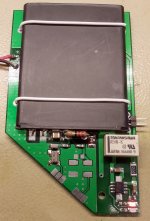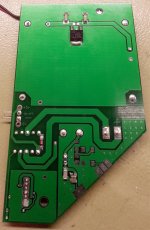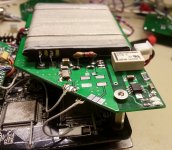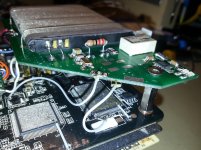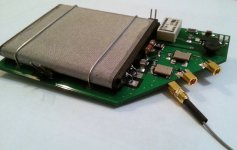There is no such thing...one of these pairs should be negative AC, correct?
Have a read of this:
Multiple Winding Transformer and Multicoil Transformers
EDIT: sorry I think you mean the regulator gives +/- output?
Perhaps read this (scroll down): http://www.decdun.me.uk/gainclone_psu.html
Perhaps read this (scroll down): http://www.decdun.me.uk/gainclone_psu.html
Last edited:
Anyhow....up and running...
My PSU is giving out slightly more than 15V on both rails, 0.6V extra. ..I'm sure the opamps can tolerate the difference.
Sounding very nice (also replaced clock signal wiring with proper bnc coax.) Stage/separation are noticeable improved and I think dynamic range too, especially down low...just overall more "there".
I need to shorten those power leads, and put a strain - relief on the Xonar side. ..
Thanx everyone for all the help on this! Coris, you da man!
Sent from my SM-G900W8 using Tapatalk
An externally hosted image should be here but it was not working when we last tested it.
My PSU is giving out slightly more than 15V on both rails, 0.6V extra. ..I'm sure the opamps can tolerate the difference.
Sounding very nice (also replaced clock signal wiring with proper bnc coax.) Stage/separation are noticeable improved and I think dynamic range too, especially down low...just overall more "there".
I need to shorten those power leads, and put a strain - relief on the Xonar side. ..
Thanx everyone for all the help on this! Coris, you da man!
Sent from my SM-G900W8 using Tapatalk
Very nice you have finished your project with good results. At least expected...
I have also noticed too, that en increasing in a system fidelity it give a obvious effect in the low end of the audio frequencies. Increasing of the bandwidth for high frequencies it is reflected very well in the low end of the spectre. This is very interesting, and quite obvious...
I see in your picture the processor fan. It is not disturbing its noise? As you have quite plenty of space around, maybe an fan less it may be a good choice/solution... I mean a bigger heat sink without fan...
Now it may be the time for a new project...
I have also noticed too, that en increasing in a system fidelity it give a obvious effect in the low end of the audio frequencies. Increasing of the bandwidth for high frequencies it is reflected very well in the low end of the spectre. This is very interesting, and quite obvious...
I see in your picture the processor fan. It is not disturbing its noise? As you have quite plenty of space around, maybe an fan less it may be a good choice/solution... I mean a bigger heat sink without fan...
Now it may be the time for a new project...
Thanks Coris. ..
Yeah, a fan less heatsink would be ideal, given the space. It is a quiet, low rpm fan however. I think I just might look into that!
The 120mm fan underneath for the PSU, it's rather noisy...but necessary. A better quality unit is needed.
Eventually, I will change the wiring off the psu/Xonar...what I have now is overkill...something a little more discrete.
I might have to think about swapping opamps as well!
Sent from my SM-G900W8 using Tapatalk
Yeah, a fan less heatsink would be ideal, given the space. It is a quiet, low rpm fan however. I think I just might look into that!
The 120mm fan underneath for the PSU, it's rather noisy...but necessary. A better quality unit is needed.
Eventually, I will change the wiring off the psu/Xonar...what I have now is overkill...something a little more discrete.
I might have to think about swapping opamps as well!
Sent from my SM-G900W8 using Tapatalk
Here is the right version of my battery powered clocks PCB.
It can be populated with, and it can power up to 4 oscillators of different foot prints. This board is suitable/designed to be used on ST/STX sound cards (it fits mechanically with ST/STX). But it can be also used on what so ever system.
A new and improved design of this board is in production now. The new board it will have accessible pads from the pin 1 (Enable) of all 4 oscillators, as a simple start up delay circuit, in case it will be necessary for a more precise control of the clock signal in conjunction with the host system power up sequence.
One may note that as it is this circuit, there exist a delay for clock signal start induced by the relay itself. There is about something into 15-20ms, depending of the relay construction/specification. If this delay it may not be enough for a system power up sequence, then the Enable pin of the oscillator have to be used accordingly. The new (upcoming) board provide access to the Enable pins of the oscillators, to be connected further to the host system. Or these Enable pins it can be connected individual or all together to a simple delay circuit on board.
There is not necessary any control of the oscillators when this board is used with ST/STX sound cards, so the Enable pins are not connected/used.
The new version of Asus ST/STX sound cards use two oscillators (33Mhz, 24,576Mhz). Both these (of course better quality) oscillators can be powered by battery, using this board, and the output pins (clock) is to be inserted into the right place, through a 0,8 mm thin coax. The same when is to be used this board in another different systems (the coax length it have to be minimised).
The battery charging circuit it can be connected to a 9-12v DC, or to 5v DC rails, depending on the host system. when is to be connected to a 5v rail, the 7805 regulator on board have to be bypassed (shorting its in/out pins). A gap on the traces is provided for this task. Charging current is limited to 400mA, and monitored by a specialized chip. A protection by a resettable fuse is provided in the circuit.
It can be populated with, and it can power up to 4 oscillators of different foot prints. This board is suitable/designed to be used on ST/STX sound cards (it fits mechanically with ST/STX). But it can be also used on what so ever system.
A new and improved design of this board is in production now. The new board it will have accessible pads from the pin 1 (Enable) of all 4 oscillators, as a simple start up delay circuit, in case it will be necessary for a more precise control of the clock signal in conjunction with the host system power up sequence.
One may note that as it is this circuit, there exist a delay for clock signal start induced by the relay itself. There is about something into 15-20ms, depending of the relay construction/specification. If this delay it may not be enough for a system power up sequence, then the Enable pin of the oscillator have to be used accordingly. The new (upcoming) board provide access to the Enable pins of the oscillators, to be connected further to the host system. Or these Enable pins it can be connected individual or all together to a simple delay circuit on board.
There is not necessary any control of the oscillators when this board is used with ST/STX sound cards, so the Enable pins are not connected/used.
The new version of Asus ST/STX sound cards use two oscillators (33Mhz, 24,576Mhz). Both these (of course better quality) oscillators can be powered by battery, using this board, and the output pins (clock) is to be inserted into the right place, through a 0,8 mm thin coax. The same when is to be used this board in another different systems (the coax length it have to be minimised).
The battery charging circuit it can be connected to a 9-12v DC, or to 5v DC rails, depending on the host system. when is to be connected to a 5v rail, the 7805 regulator on board have to be bypassed (shorting its in/out pins). A gap on the traces is provided for this task. Charging current is limited to 400mA, and monitored by a specialized chip. A protection by a resettable fuse is provided in the circuit.
Attachments
Last edited:
- Home
- Source & Line
- PC Based
- Xonar ST/STX mods...
